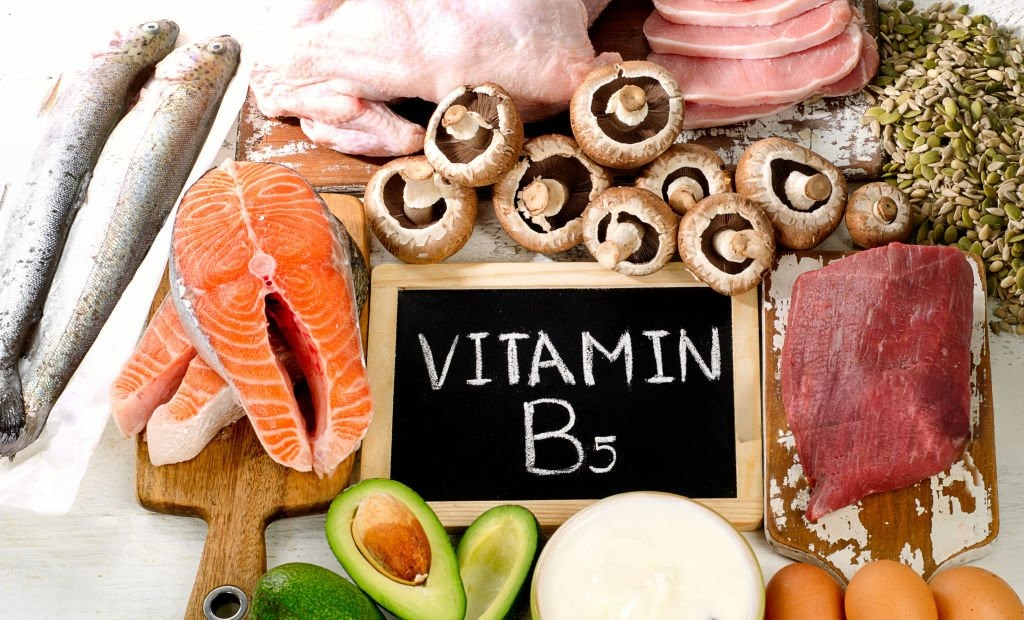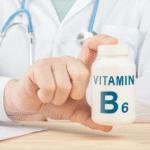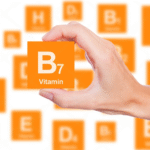What Is Vitamin B5?
Vitamin B5 is also known as pantothenic acid. It is one of eight B vitamins. It is a water-soluble vitamin category, which means the body can not store it for a long time. So you should take it regularly from foods.
It plays a vital role in supporting converting foods into energy similar to all B vitamins. It also plays other important roles that will be discussed below in the article.

Why Does Your Body Need Vitamin B5?
Energy Production and Metabolism
Imagine your body as a vehicle and food as fuel. Vitamin B5 is like a spark plug. It helps fuel your metabolic engine. It is essential for making coenzymes A (CoA). Which is a key player in converting fats, carbohydrates, and proteins into energy.
Hormone and Cholesterol Synthesis
Pantothenic acid is important for making adrenal hormones like cortisol, which helps manage stress. It also plays a role in producing cholesterol. Yes, the body also needs cholesterol, especially for hormone production and cell membrane integrity.
Skin and Hair Health
Ever see B5 listed in your skincare products? It’s no coincidence. This vitamin helps maintain a healthy skin barrier, deeply hydrates, and also aids in hair growth and strength. Dull hair or dry skin? B5 could be part of the fix.
Wound Healing and Immunity
Vitamin B5 helps speed up wound healing by promoting skin cell regeneration. It also supports your immune system by increasing the production of antibodies and reducing inflammation.
Top Food Sources of Vitamin B5
Animal-Based Sources
- Chicken liver
- Beef
- Turkey
- Salmon
- Eggs
- Milk and cheese
These options provide easily absorbed forms of the vitamin.
Plant-Based Sources
- Avocados
- Mushrooms (especially shiitake)
- Sweet potatoes
- Sunflower seeds
- Broccoli
- Legumes
Although the amounts are small, you can still meet your needs with a varied diet.
Fortified Foods and Supplements
Some cereals, nutritional yeast, and plant-based milks are fortified with B5. Supplements can help if you’re not getting enough, but natural food sources are always the best options.
Deficiency Symptoms
Vitamin B5 deficiency symptoms are as follows:
- Fatigue and irritability
- Insomnia
- Nausea or stomach cramps
- Numbness or burning in the feet (a condition called “burning feet syndrome”)
- Headaches
Who’s Most at Risk?
People are at risk of deficiency with alcohol use disorders, other nutritional deficiencies, chronic stress. Or those individuals who take certain medicines may be more susceptible to deficiency.
Additionally, people with digestive disorders such as Crohn’s disease or celiac may not absorb it properly.
How Much Vitamin B5 Do You Need?
| Age group | RDA |
| New Born | 1.7-1.8 mg |
| 1-3 years | 2 mg |
| 4-8 years | 3 mg |
| 9-13 years | 4 mg |
| 14 years and older | 5 mg |
| Pregnant | 6 mg |
| Breastfeeding | 7 mg |
Can You Get Too Much?
Vitamin B5 is a water-soluble category vitamin, so the excess amounts are usually excreted through urine. Over-doses (like 10-20 grams a day) can cause diarrhea or intestinal discomfort. Stick to the recommended dosage unless your doctor says otherwise.
Always consult your healthcare provider before taking any step by yourself.
Vitamin B5 Supplements: What to Know
Different Forms of Pantothenic Acid
Supplements are available in various forms:
- Calcium pantothenate – common and stable
- Pantethine – Highly bioactive, often used in cholesterol-lowering treatments.
- Dexpanthenol – Often used primarily
Each has different strengths to suit your needs.
Choosing a Quality Supplement
Look for third-party tested brands, preferably with GMP (Good Manufacturing Practice) certification. Choose clean labels with minimal fillers.
Interactions and Precautions
Drug Interactions
Vitamin B5 is generally safe, but large doses may interfere with:
- Antibiotics like tetracycline
- Alzheimer’s drugs (like donepezil)
- Blood thinners in very high doses
Always consult your healthcare provider before taking any supplements by yourself.
Safety Considerations
Pregnant or nursing? Stick to dietary sources or follow your doctor’s advice. For topical use, do a patch test first to avoid allergic reactions.
Final Thoughts
Vitamin B5 may not be the flashiest nutrient, but it’s a backstage MVP for energy, hormone production, skin health, and more. Because it is found in a wide range of foods, most people get enough without trying. But if you suffer from chronic stress, have a poor diet, or deal with digestive issues, a little extra focus on B5 could be a game-changer.
FAQs
1. Can I take Vitamin B5 every day?
Yes, since it is water-soluble and not stored in the body, it is necessary to consume it daily through food or supplements.
2. Is Vitamin B5 good for acne?
Absolutely. Its anti-inflammatory properties and hydrating benefits make it a favorite in acne treatments and skincare routines.
3. How do I know if I’m deficient in Vitamin B5?
Look for symptoms such as fatigue, irritability, numbness in the feet, or digestive upset. A healthcare provider can help confirm with a nutritional analysis or test.
4. Can I get Vitamin B5 from multivitamins?
Yes, most multivitamins include it, but the amount can vary. Check the label for “pantothenic acid” or “calcium pantothenate.”
5. Are there any side effects of too much Vitamin B5?
In large doses (more than the usual dosage), it can cause diarrhea or nausea. But these cases are rare.


